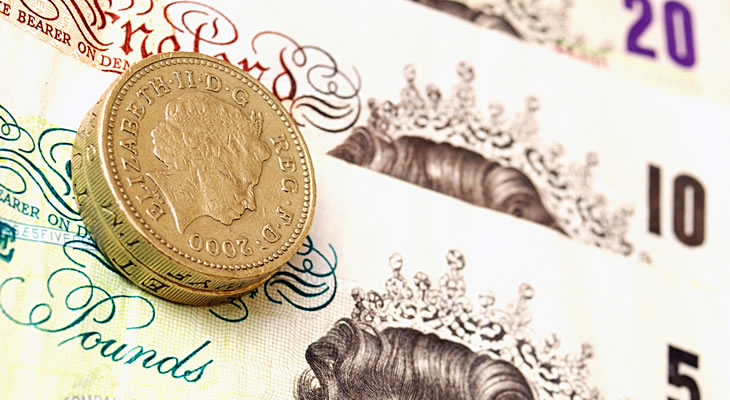GBP: Sterling Bearish after Conflicting Takes on Carney Speech
Sterling fluctuated yesterday as Bank of England (BoE) Governor Mark Carney announced that British banks would have to hold onto an extra £11 billion in capital reserves to safeguard in the event of a future economic slump. Some traders deemed this announcement as a sign of confidence in the UK economy, which gave Sterling a short lived boost. Other traders were slightly more hesitant, however, as an increase in capital requirements could push loan prices up, which could take some momentum out of the credit market and ultimately diminish the need for a near-term rate hike. The reaction to Carney, then, was split and with traders awaiting the big Queen’s Speech vote tomorrow the pound registered as predominantly bearish.
There was positive UK house price data this morning however, as Nationwide reported house price growth of 3.1% in May, year-on-year, up from a previous figure of 2.1%
This significant uptick is primarily a result of low mortgage rates and healthy employment levels. While this was good news for the UK economy, this week Sterling remains predominantly driven by BoE soundbites and political news regarding Theresa May and Brexit.
EUR: Sterling Falls against the Euro as Draghi Speech Propels the Single Currency
Sterling lost some momentum against the Euro yesterday as a speech by European Central Bank (ECB) President Mario Draghi propelled the single currency.
The Euro’s jump was predominantly driven by a shift in semantics, as whilst Draghi previously claimed that the need for stimulus was ‘very substantial’, this time he claimed that the need was of a ‘considerable degree’. A very marginal shift in rhetoric, but enough for traders to prognosticate that quantitative easing may be unwound sooner than thought.
All eyes and ears today will be on the Policy Panel which will include Mark Carney, Draghi, Bank of Japan (BoJ) chief Kuroda and Bank of Canada (BOC) Governor Stephen Poloz. Traders will be focused on Draghi’s attitude, particularly if he attempts to reign in reactions to yesterday’s comments. The attitude of Poloz will also be significant, as he and Deputy Governor Wilkins have become increasingly hawkish in recent weeks.
USD: US Dollar (USD) Stumbles as IMF Criticises Trump’s Economic Policy
Sterling made some gains yesterday against the US Dollar following a negative report from the International Monetary Fund (IMF).
The IMF cut its 2017 US growth forecast down from 2.3% to 2.1%, as well as its 2018 forecast from 2.5% to 2.1%.
The revision occurred following their new review of US President Donald Trump’s economic policies, with the reason cited that the Trump administration’s tax cuts and fiscal spending plans were no longer considered likely to provide such significant growth.
With details regarding the White House’s tax plans being few and far between, the lack of information makes it problematic to see growth continuing as anticipated.
The head of the IMF’s Western Hemisphere Department, Alejandro Werner, said in a press conference:
‘Looking at the U.S. data, it is unlikely that these set of policies can generate an acceleration of economic growth of a magnitude of let’s say approximately 1 percentage point.’
This weighed on the US Dollar.
Separately, a report on US consumer confidence jumped from 117.6 to 118.9, higher than estimates of only 116.0. The report did not however move the US Dollar from its brief dip.
Federal Reserve Chairwoman Janet Yellen suggested yesterday that US asset values are overpriced. Though the Fed chair did not alter her projection for a ‘gradual rise’ in interest rates, the ‘Greenback’ did take a small hit as a result.
CAD: Fourth Consecutive Rise for Crude Oil Bolsters the Canadian Dollar (CAD)
Canada’s most-lucrative export, crude oil, rose for its fourth consecutive session yesterday. Despite Texas tea still being in a significant slump, the continued climb was enough to bolster the Canadian Dollar.
Traders today will be carefully studying the remarks from the Bank of Canada’s (BoC) Stephen Poloz. Not only has Poloz been more hawkish of late, he also spoke to CNBC this morning and claimed that rate cuts ‘have done their job’, a statement that has already seen the ‘Loonie’ climbing against Sterling.
AUD: Sterling Gains against the Australian Dollar (AUD) following Nicola Surgeon Speech
Sterling saw some gains against the Australian Dollar yesterday afternoon, oddly enough following the speech from Scottish National Party leader Nicola Sturgeon. Sturgeon announced that Scotland would not be having a second referendum in 2018 or indeed 2019, instead it would be most likely moved to 2021. Traders considered this a sign for the potential that a cross-party Brexit team might come together in an attempt to keep the UK in the EU single market, thus driving small demand for the Pound.
The ‘Aussie’ Dollar losing ground however was predominantly the result of traders selling in favour of momentarily bullish European currencies.
GBP: New Zealand Dollar (NZD) Drops in Favour of Safer European Currencies
Yesterday morning Sterling dipped massively against the New Zealand Dollar as a result of the latest political developments and Brexit negotiations failing to support Sterling. As the day progressed, however, the Pound New to Zealand Dollar exchange rate rallied significantly (up some two cents) – most likely due to traders selling the ‘Kiwi’ Dollar in favour of rallying European currencies.


Comments are closed.